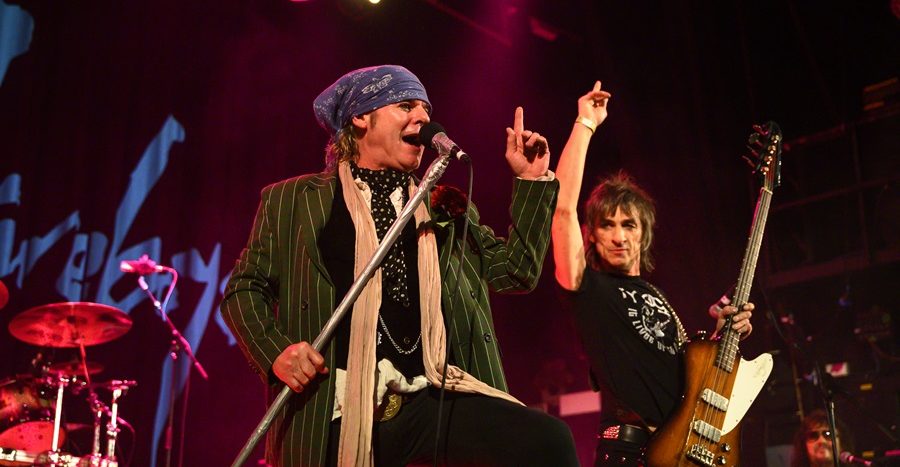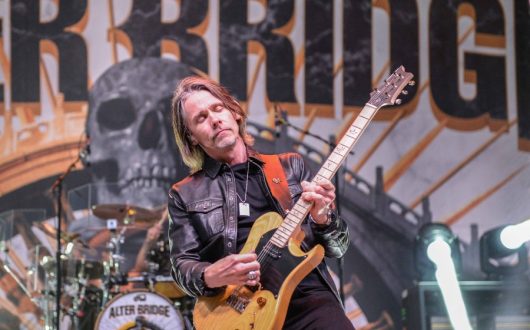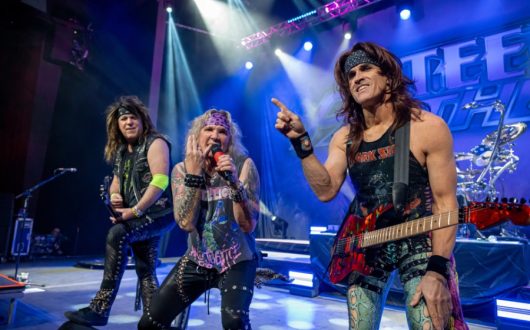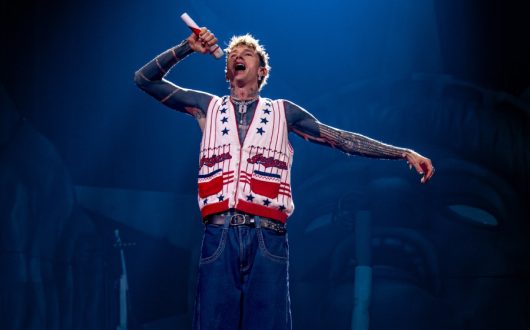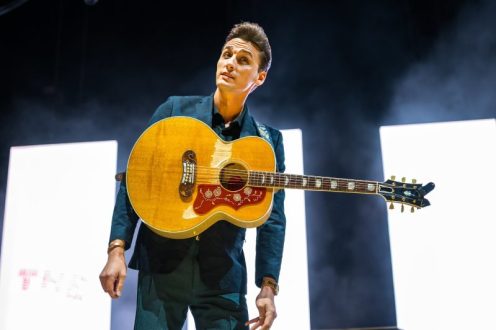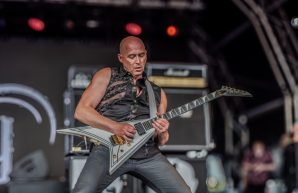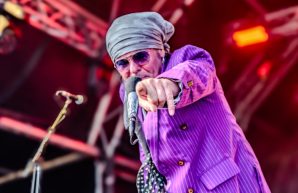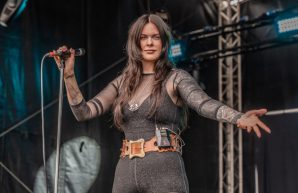Interview by Adrian Hextall / Photos (C) MindHex Media
To sit down with Spike is to sit down with one of rock and roll’s great narrators. He doesn’t just answer questions; he spins yarns, pulling you into a world of 80s building sites, legendary backstages, and raw, heartfelt emotion. After a tumultuous few years that have seen him fight for the very name of the band he founded and grieve the loss of his oldest friend, he’s back, defiant and more creative than ever.
With a phenomenal new Quireboys album, Wardour Street, earning rave reviews and a packed summer of festivals ahead, we caught up with the quintessential survivor to talk about the past, the present, and the future. He was in fine form, discussing everything from a brand-new solo project to an infamous backstage brawl with a guitar legend.
MGM: First off, Spike, it’s great to see The Quireboys back on the festival circuit and you’re returning to Maid of Stone this summer. With the brilliant new album Wardour Street in your back pocket, how do you balance the setlist between the new songs you’re rightly proud of and the classics everyone expects?
Well, how long have we got to play at these festivals? An hour? We’ll be playing a mixture of it, you know. With an hour, we’ll get everybody going. I think for the festivals that we’re doing, the ones we aren’t headlining, we have about 45 minutes to an hour. But then there are a few we are headlining. I mean, I didn’t expect us to get anything this year, realistically. And then all of them came in! We’re playing a festival every weekend in July and every weekend in August now.
MGM: The new album, Wardour Street, feels like a real statement. Where did that record come from, creatively?
When me and Guy [Bailey] were putting songs together, we were in a pub or somewhere and I said, ‘Come on, let’s write a new song then.’ He went, ‘We’ve written fucking hundreds! What we gonna write about now?’ I said, ‘Let’s have a look out the window where we are… it’s fucking Wardour Street!’ And he says, ‘Oh. So there it is!’ You know, I miss my crazy mate, but he got the idea.
It’s been a hard time. His spirit is all over that album. There’s a beautiful dedication to him on there, which is a nice closure point for what he meant to us. But you know what, mate? He talks on it as well. If you listen to the song ‘Wardour Street’, I snuck his voice on it at the end. I didn’t tell anybody. A nice touch.
It’s been really difficult for me to listen to anything. Even when I’m singing ‘I Don’t Love You Anymore’ or ‘King of New York’, all I do is think of him. But I think about how we wrote them. It’s weird, and I’m really going to have to concentrate when I’m doing them live because I could break down like that, you know what I mean? It really is difficult. I can’t believe it’s 35 years since we released the first album as well.
MGM: To create the album, you brought in another old friend, Luke Morley from Thunder, to produce and play guitar. Why was he the right man for the job?
When I was putting this stuff together after Guy died, the one person that was there since I moved to London, when we first started The Quireboys, you had Terrorvision, Thunder, Dogs D’Amour, and us. We were all playing together, all in the same boat. Luke Morley remembered when we were just one guitar, Guy Bailey. And that’s how we always wanted it. Me and Guy, we never wanted two guitars. It was at the height of Guns N’ Roses and all that, and Phil Mogg, who was Nigel’s uncle, was like, ‘You should get another guitar, get it a bit more rock.’ But we always found that it worked better with just Guy and the piano. It let it breathe more.
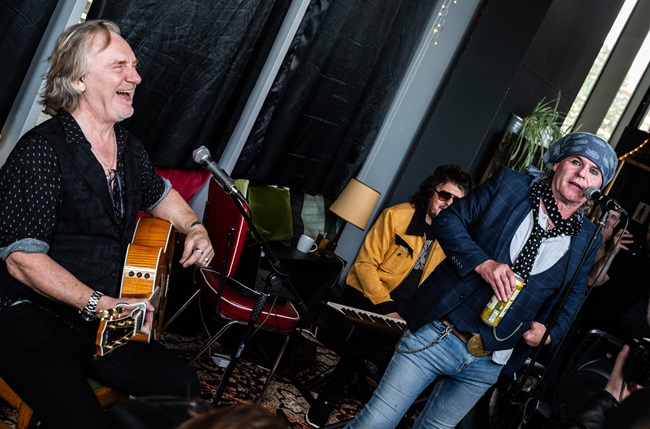
Luke really understood where I was coming from. We’re not Americana, right? We’re English rock and roll. And we’d been forgetting that for a while. He totally understood. We’ve always been such good friends. When we played Donington together, I left with Thunder on their bus! We were always helping each other, just good pals having a laugh. So, to do something musically together, it was brilliant.
MGM: Before we got Wardour Street, you had to endure a very public battle for the band’s name. It was a situation handled with a lot of dignity from your side.
When all that shit happened, the shambles and everything, I was with Guy. He was the first person to call me. Well, the first person to call was Fish! That’s a bit random. But Guy called and was so upset. Everybody wanted to say stuff, because there was so much nastiness and so many lies. And it was very difficult because all my family, everybody’s families were going, ‘What the hell is going on?!’
We just went, ‘You know what? I don’t want to lower ourselves to what’s going on.’ It was very difficult to do, but I wasn’t brought up like that. I said, ‘Just bide your time, then we’ll come out good on the end of this.’ The end result is the right one. I knew it would be anyway, because there’s no way on this earth they could have had the name. There wasn’t one original member there, for a start. And the fan base would never have accepted it.
MGM: The return of founding bassist Nigel Mogg seems to have been a huge part of this rebirth. It must be fantastic having him back.
Everybody came back! Rudy [Richman], Chris [Johnstone], everybody. They all have their own lives, but they all said, ‘You can’t let this happen.’ Everybody’s very shocked about Nigel, because everybody thinks Nigel can’t play! I remember when he’d done the album and I asked Luke, ‘How much of his bass have you had to replace?’ He went, ‘Actually, he came in all prepared and he was wonderful.’ And if you watch him live, he’s on the ball. It’s so great to have him back. It’s like me and him again. I can’t wait to get on stage, get away from all this shit around us, and just relax. We’ve always been the same, we love it.
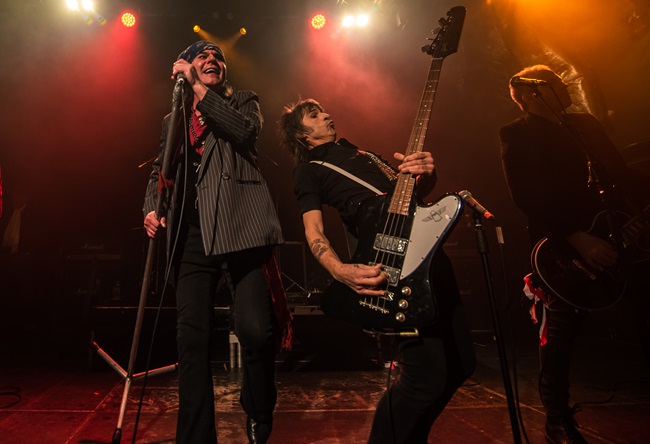
MGM: Going right back to the beginning, the story of how you and Guy met is the stuff of legend. Is it true you were working together before you even knew each other played music?
Yeah, on a building site in London. His flat used to overlook the Oval cricket ground. My father turned up and he brought my guitar down, a Yamaha acoustic he’d got me when I was 14. I turned up at Guy’s flat with my guitar and he went, ‘Do you play the guitar?’ I was like, ‘Yeah?’ We’d never talked about music. Ever. I didn’t know he could play, he didn’t know I could.
That week was England against the West Indies. My dad was watching the cricket out the window. And in that flat, we wrote ‘How Do You Feel?’, ‘Roses and Rings’, and ‘Mayfair’. My dad never said a word, then he looked at us and goes, ‘Do you know what? You two should start a bloody band.’ That’s how it started. It’s the truth. Is that weird? It was either going to be that or I’d have just stayed on the building site.
MGM: And the name itself has a similar origin story?
Yeah, we were on the building site, and we were called The Choirboys then, spelt C-H-O-I-R. The same guy came up, and once we started the band we were dressed like The Faces, you know? There were no hi-vis jackets then! He looked at us, with guy-liner and eye smudge from the night before, and he says, ‘I hear you guys are in a band. What are you called?’ We said, ‘The Choirboys.’ He went, ‘The Choirboys?! With the way you look, you should be called the fucking Queerboys!’ We went, ‘Oh, what a great name!’ We just thought we’d have a laugh, we never packed in the job.
MGM: You mentioned you’re keeping busy with a new solo project too, which sounds fascinating.
I haven’t told many people about it yet, but I’ve been doing a new thing called ‘Spike and the Geordie Rogues’. Basically, it’s from my mother. She saw Sting on the telly, singing his shipbuilding songs, and she said to me, ‘You were taught the guitar by Alex Glasgow! You know all them Geordie folk songs. You could sing it in a real Geordie accent, not like his fake one!’ So I said alright, I’ll do an album of Alex Glasgow songs for you.
I went down to my mate’s studio in a castle and I was just playing them, and he went, ‘Mate, this is too good. Why don’t you get Northumbrian instruments, do it in that vein?’ So I did. I got whistles on it, it’s wonderful. And then I sat down and I wrote a song about my mother, and then another song came, and another one, all about Newcastle. It’s been so much fun. (Keep an eye out for more info on this from Spike!)
MGM: You’ve had so many ‘pinch-me’ moments in your career. What was it like being on the receiving end of that massive Kerrang! hype for the debut album? I remember queuing outside HMV on Oxford Street when you did the signing.
You know what happened that day? There were thousands of kids there, it was heaving. That was the beauty of things like Kerrang! back then. When you look at that magazine with us and Dogs D’Amour on the front cover – two unsigned bands! It was incredible. I feel sorry for young bands now. We had our apprenticeship, going up and down the motorway in that bloody Bedford van.
The Cherry Bombs tour, that’s when we packed our jobs in. And it was weird, I got offered the job in The Cherry Bombs, and then Frankie Goes to Hollywood. Holly Johnson had left. I got offered 350 quid a week off them, but I was making 420 quid a week on the building site! But I’ve still got the tape of me singing ‘The Power of Love’ and ‘Warriors of the Wasteland’. My mum said to me, ‘Oh, you’ve got to play ‘The Power of Love’ because nobody knows you were nearly in Frankie Goes to Hollywood! You would have been a gay icon!’ I said, ‘Mum, I already am!’
MGM: You’ve toured with everyone and have a reputation for being a great live act. You also have one of the most famous stage moves in rock with the mic stand kick.
You know what? That just comes naturally. That’s not something you can practice. I first saw Paul Rodgers do it. But it was just that. Everybody thinks I was a huge Rod Stewart fan, but I was like everybody else, I knew ‘Maggie May’, the hits. Guy Bailey was the one who was the big Faces fan; my band was always The Rolling Stones. I was obsessed. I’d never even owned a Faces album, so it’s weird I get all that. It’s just the way my voice came out.
MGM: The rock and roll lifestyle has led to some legendary stories. There’s one involving a famous German guitarist that needs to be told…
Michael Schenker? Okay… so it was UFO’s last tour, at Newcastle City Hall. I’d broken my leg, so I was on crutches. After the gig, Schenker comes in the dressing room, fucking off his head, you know? He’s going, ‘You fucking this and that!’ It was me and Phil Mogg in the dressing room. He walked out, came back in, yelling, ‘And you Spike, from some fucking Queer Boys, you motherfucker!’ And he went to hit me. I fucking nutted him and smacked him. Knocked him unconscious on the floor. My crutch went flying!
He woke up and his wife was there, they’re trying to get me arrested. The police came in, and the guy in the uniform and the detective walked in and went, ‘Spike, we’ve been dying to meet you for years!’ The next night was Manchester, and he had a huge shiner, a huge black eye. He’d written ‘SPIKE DONE THIS’ on his forehead with an arrow! I felt so bad, until Phil said to me, ‘Luckily it was the end of the tour!’ I haven’t had any spirits – cognac, brandy, vodka – in like six, seven years because of that. I looked at my hand and I’m like, I’ve got two knuckles left!
MGM: Finally, looking to the future, as well as The Quireboys, you have another very special project lined up to honour Guy’s memory.
Yeah. He had a band called Thirsty, that he’d done with Chris Johnstone’s wife and Chris Kimsey, who produced our second album. I spoke to Kimsey today, and I’m going to go in and sing on about 11 or 12 songs for the Thirsty album. I’m going to be singing with Guy Bailey. So I’ll be duetting with him. I’m really looking forward to that. It’s really cheered me up, actually. The songs are fucking brilliant. It’ll be a nice touch, and a wonderful way to remember him.
The Quireboys will be performing at festivals during July and August and we’ll be catching their set at Maid of Stone Festival which runs from July 18-20.
The new Quireboys official website is also live and can be found here:
